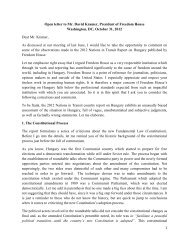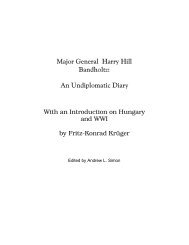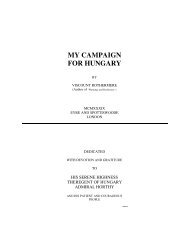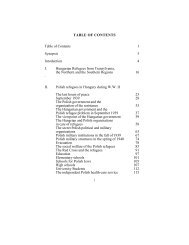The Fate of Western Hungary 1918-1921 - Corvinus Library ...
The Fate of Western Hungary 1918-1921 - Corvinus Library ...
The Fate of Western Hungary 1918-1921 - Corvinus Library ...
You also want an ePaper? Increase the reach of your titles
YUMPU automatically turns print PDFs into web optimized ePapers that Google loves.
y Ostenburg in Sopron, and who wished to fight in the free force, only about<br />
fifty volunteered for regular military service at Ostenburg’s appeal. Among<br />
them, a few reservist <strong>of</strong>ficers, Captain Madersbach (correctly Viktor<br />
Maderspach 316 ) with 12 men, and a few Szeklers.” 317 In the evening <strong>of</strong> the same<br />
day, the 28 th , PM Bethlen contacted Sigray in Sopron by telegraph at 23:00<br />
hours and gave detailed instructions, which he asked to be “executed with the<br />
greatest vigor.” To wit, the removal from the territory still under the control <strong>of</strong><br />
the Hungarian government <strong>of</strong> the command staff <strong>of</strong> István Friedrich, Iván<br />
Héjjas, non-Sopron residents and persons with no business in <strong>Western</strong><br />
<strong>Hungary</strong>. If armed, they are to be disarmed and expelled by force. <strong>The</strong><br />
interruption <strong>of</strong> train service and the ripping up <strong>of</strong> railway tracks must be<br />
prevented. 318 Earlier in the day, in the afternoon hours, an Austrian force (202<br />
gendarmes and 22 revenue <strong>of</strong>ficers) was making its way from the Austrian<br />
village <strong>of</strong> Friedberg in the valley <strong>of</strong> the Pinka River when it ran into a small<br />
force <strong>of</strong> 50 near Pinkafő, led by 1 st Lt. László Kuthy. After a sharp fire fight,<br />
the Austrian force, even though outnumbering the Hungarians 9:2, withdrew<br />
before darkness fell and retreated back to Austrian territory. 319<br />
At 11:00 in the morning <strong>of</strong> August 29, PM Bethlen again instructed Sigray<br />
by telegram that “irresponsible elements are to be disarmed and held in check,<br />
as well as Friedrich and Héjjas are to be rendered harmless.” <strong>The</strong> situation<br />
report <strong>of</strong> the Chief Government Constable then recounted that there was total<br />
peace and quiet during the night in Sopron; Friedrich was no longer in the city<br />
and the whereabouts <strong>of</strong> Héjjas was not known. At 10:00, he had held a review<br />
<strong>of</strong> the Ostenburg battalion, which was greeted with great enthusiasm by the<br />
population. “Irresponsible elements were shown that a large, disciplined force<br />
was standing ready for our disposition.” <strong>The</strong>re were no reports <strong>of</strong> disturbances<br />
from Sopron and Moson Counties. Austrian gendarmes were unable to march<br />
into Pinkafő in Vas County, however, Szentelek was occupied by them the<br />
previous evening. <strong>The</strong> population <strong>of</strong> the village <strong>of</strong> Németszentgrót chased away<br />
the Austrian forces; in Rábakeresztúr, 17 Austrian gendarmes and revenue<br />
<strong>of</strong>ficers crossed the Trianon border, who were then disarmed by the Hungarian<br />
customs force and sent to Szentgotthárd. <strong>The</strong>re were no reports from the village<br />
316<br />
Maderspach, Viktor: Élményeim a nyugatmagyarországi szabadságharcból [My<br />
adventures in the <strong>Western</strong> <strong>Hungary</strong> freedom fight]. In: Magyarság, 1926, issues 1–5<br />
and 7–38. Viktor Maderspach (1875-1941), volunteered for service in WWI and<br />
organized a mounted free-force after Romania’s 1916 entry into the war, with which he<br />
reached the Black Sea. He demobilized as a Hussar captain at the end <strong>of</strong> the war. He<br />
was charged with suspicion <strong>of</strong> anti-Romanian activities in the summer <strong>of</strong> <strong>1921</strong>, escaped<br />
from Transylvania and joined the <strong>Western</strong> <strong>Hungary</strong> insurrection. He commanded the 5 th<br />
Rebel Army until September 24, then served in the Ostenburg battalion in Sopron.<br />
Promoted to major by King Charles IV.<br />
317<br />
MOL. K 26. 1388. csomó. 1922–„H” tétel, p. 327.<br />
318<br />
Ibid, pp. 246–247.<br />
319<br />
A Rongyos Gárda harcai 1919–1939 [<strong>The</strong> battles <strong>of</strong> the Ragged Guard 1919-1939].<br />
Budapest, 1940, pp. 102–107.<br />
124
















